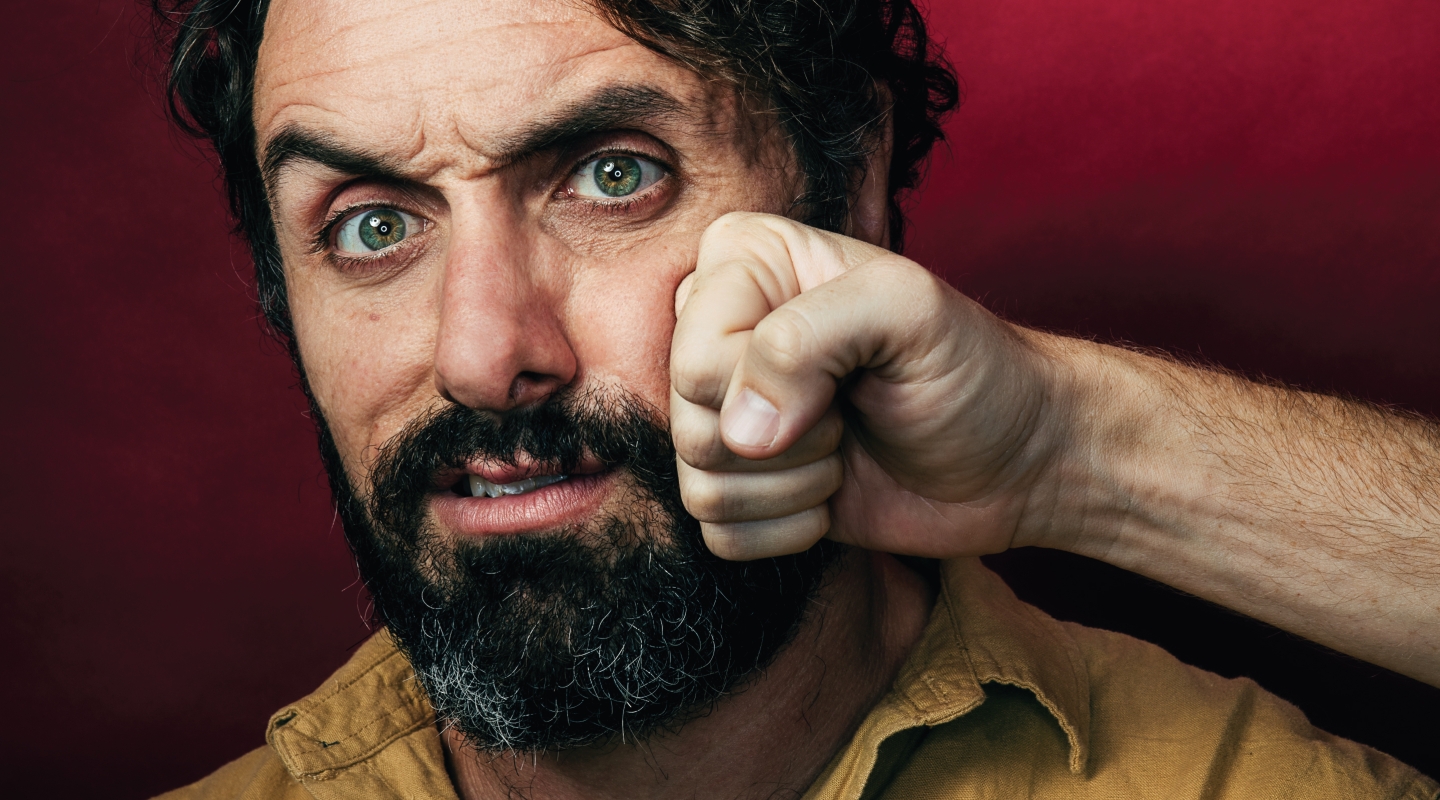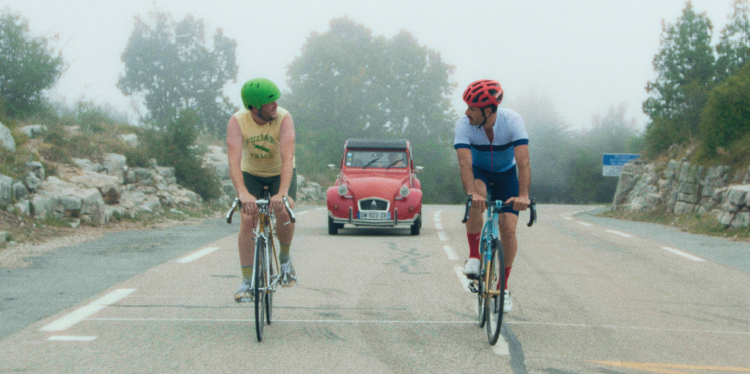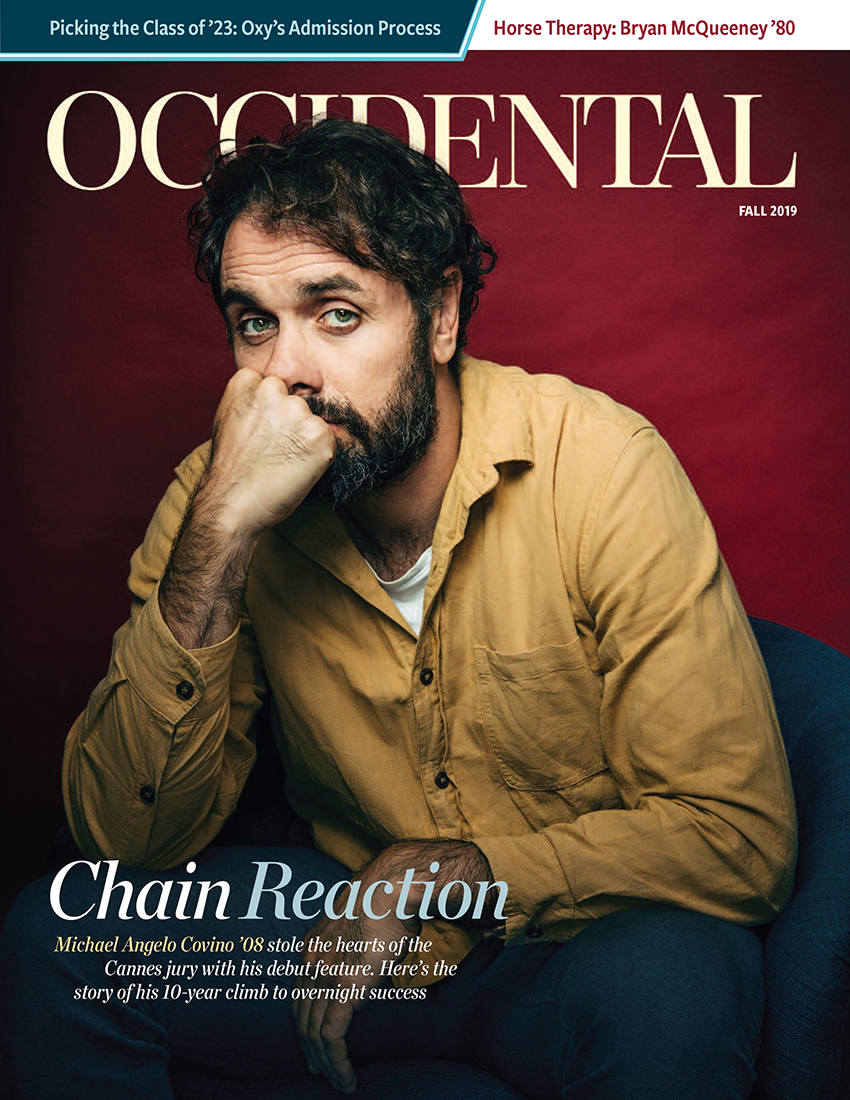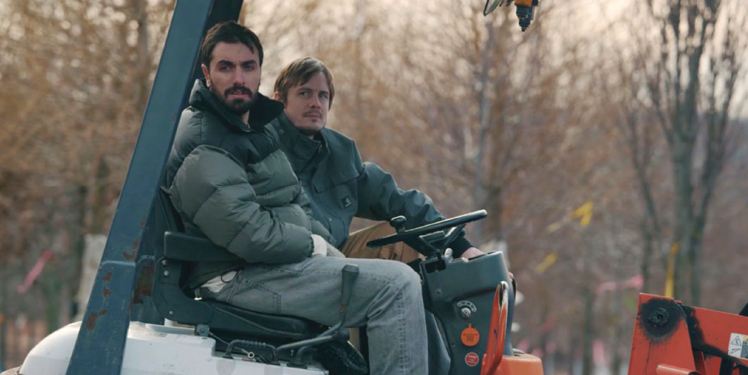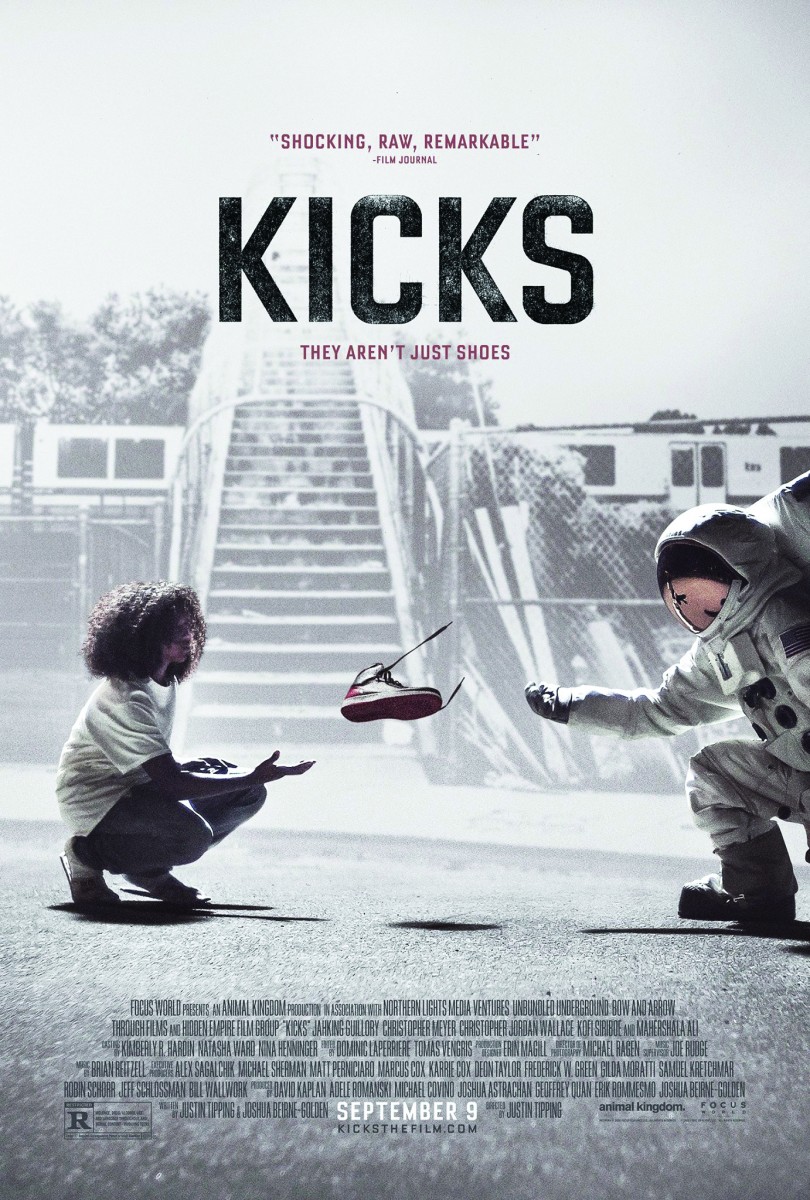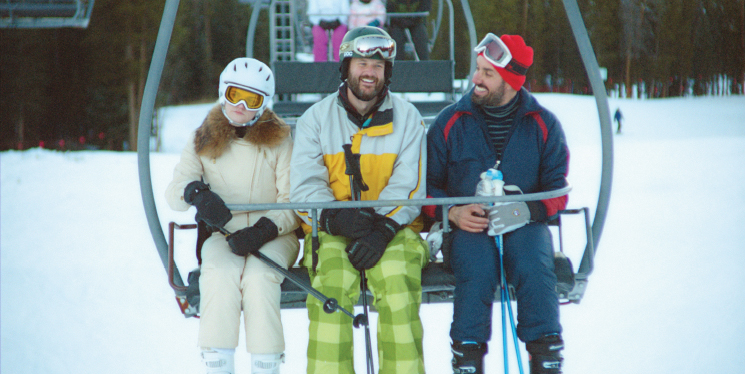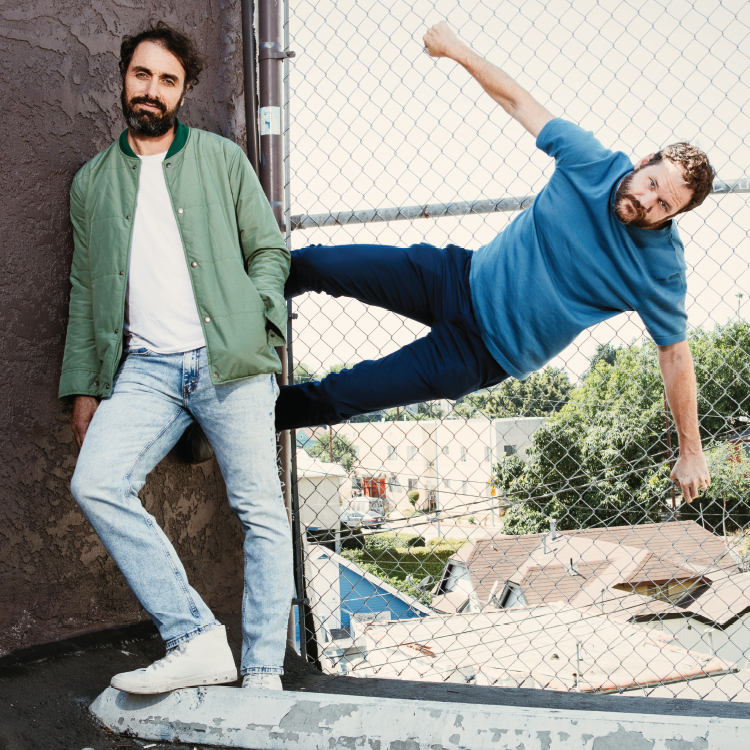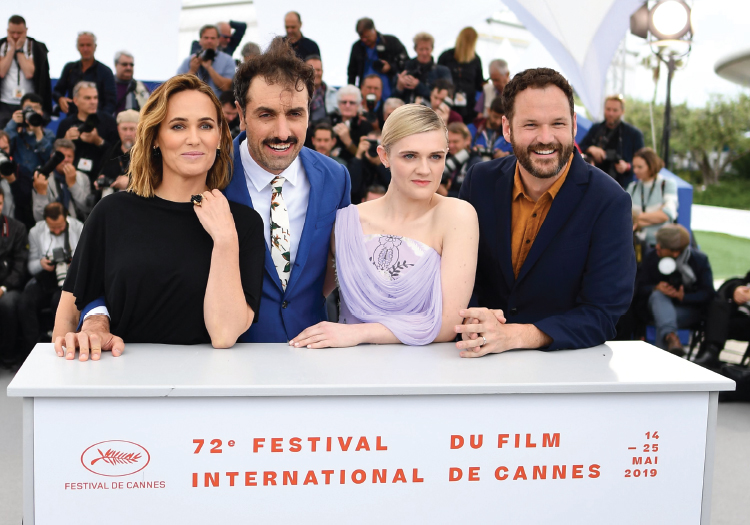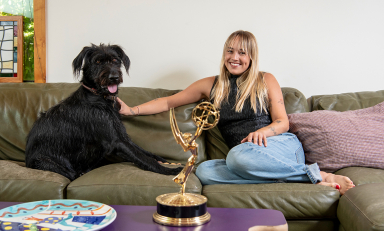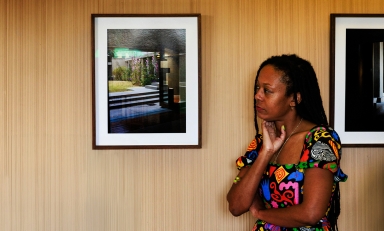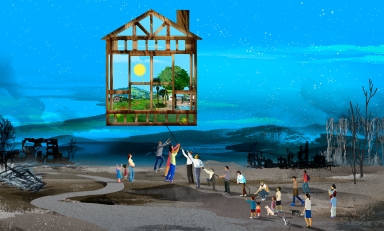How did actor-producer-director Michael Angelo Covino ’08 become the sweetheart of the festival circuit with his feature film directorial debut, The Climb? It’s not as easy as riding a bicycle—even though he makes it look that way
There’s a very French sensibility to director Michael Angelo Covino ’08’s feature film debut, The Climb. From its opening sequence (which entailed 28 takes on a two-lane road in the South of France) to the chanson-heavy soundtrack to a historic movie theater in Chatham, N.Y., playing director Pierre Étaix’s Le Grand Amour (1969), the movie is awash in the country’s language and culture.
In May 2018, when he was riding bicycles in the French countryside and scouting locations for the film, Covino and his writing and producing partner, Kyle Marvin, were both thinking, “God, we just want to premiere this movie at Cannes.” But they didn’t want to say it out loud.Fast-forward to 2019. Nearly four months after its triumph at Cannes, The Climb had its North American premiere at the Telluride Film Festival and was an opening-night selection at the Toronto International Film Festival on September 5. Nine days after TIFF, it won the jury prize at the Deauville American Film Festival. And in November, Covino’s film was listed among the Film Independent Spirit Award nominees for Best First Feature (alongside the likes of Booksmart, The Mustang, and The Last Black Man in San Francisco). All this affection bodes well for The Climb’s release on March 20, 2020.
Life since Cannes has been largely nonstop for Covino, who spent a lot of time writing a new screenplay with Marvin before setting out on the fall festival circuit. “We’re going on a little bit of a ride with the movie,” he says. “The primary thing is making sure that we’re there to promote the movie and do whatever we have to. And the cool thing is we didn’t come into this with no ideas. We’ve got this drawer full of ideas and scripts that we’ve already written. We’re just trying to figure out what we can do and how to spend our time and what the best strategy is.”
While Covino’s narrative has the making of an overnight success story, there were a lot of sleepless nights getting there. He grew up in Westchester, N.Y., about an hour north of New York City, and went to high school in Connecticut. He transferred to Oxy from Iona College as a junior after attending Iona and Fordham University.
“I was studying business administration and finance, and I was living on the East Coast and playing at a higher level football,” says Covino, who had been starting quarterback on the 2003 state champion New Canaan (Conn.) Rams. “I just realized one day that probably my football career was going to end pretty soon, and all I ever really wanted to do with my life was make movies. So why was I not studying film and being in the place where films are made?”
In Occidental, he found a school with a football program and a film program right in the heart of Los Angeles. “It felt perfect,” he says, “so I applied, I went on a visit, and I got in.”
Covino played for two seasons at Oxy—first as a backup to Andy Collins ’07 his senior year, and then behind Justin Goltz ’09. Coach Dale Widolff, he says, “created such a beautiful community for players. The competitiveness was there but in a very healthy way.”
As for his classroom experience, “I found myself taking classes that I didn’t expect to take and learning things and having discussions and arguments that I didn’t expect to be having. It was very rewarding in that capacity, and I got to establish a foundation for my film studies. This was really an opportunity to put it to the test and actually start creating films in an academic environment.”
For his senior film, he made The Liberation of Teddy Wendin, which The Occidental Weekly described as “a comedy about a mishap concerning a misconstrued child kidnapping from a perceived abusive mother.” “It was a bit of a Coen Brothers knockoff,” says Covino, who co-emceed the Senior Film Comps presentation in Thorne Hall, “but I wanted to explore these heightened stakes and characters being placed in positions that they didn’t expect to find themselves in.
“We didn’t learn the technical side of film at Oxy, so I didn’t come out knowing a lot about cinematography or lenses or anything like that. But that wasn’t the way the program was structured—that was a thing that I would have had to do on my own. What I didn’t understand at the time, but what actually gave me a leg up later on, was that Brody [Fox] and some of our other film professors really ingrained in us the idea of story first and the importance of how and why you’re telling the story you’re telling.”
Graduating from Oxy in the midst of the Great Recession, “There was not a job in sight,” he says, “and I didn’t have any connections in the film industry.” He lived in Los Angeles for a while, working at a call center and tearing tickets as an usher at the Wiltern and Palladium for minimum wage. Things began to look up when he landed a job as a production assistant on the movie On the Road, working with director Walter Salles, but the financing fell through and the production shut down.
After a while, Covino moved back home with his parents and started directing spec commercials with his brother, Chris, “who had just graduated from a more technical film school,” he says. “We sold a bunch of spec commercials and won contests and were able to support ourselves that way for a little bit.” Along the way he met some other young filmmakers in New York, and “As things unfolded, you kind of align with people who you admire and can support and help.” One of those people was Kyle Marvin, his co-star in The Climb.
Covino and Marvin formed a company together—today they have an office in Silver Lake within walking distance “of at least nine coffee shops,” Covino says—and for the next five or six years, they made a decent living creating commercials and branded content. “That was a beautiful training ground for honing our skills as filmmakers because less is at stake,” he says. “You’re getting paid by brands to pick up a camera and tell a minute story, but it’s not like your creative vision is on the line where you told this story and no one liked it.
“What we really got to do is get the craft down as a producer and as a director and try things and use equipment that we wouldn’t be able to afford otherwise to do,” he continues. “And out of that came a really solid confidence in filmmaking that we could then translate into our own personal storytelling.”
Covino fell into producing feature films for others by chance. “When I was 25 or 26, I had this script that I’d written and I wanted to get it made. I was thinking, ‘I have to direct a movie.’ It was eating away at me.” After raising $100,000 in financing—$200,000 shy of what he would need to make the film—he came to the conclusion that it wasn’t happening.
But then he realized that perhaps the path of least resistance was to try to make other people’s films. “I’m good at solving problems and it would be easier for me to sell them instead of trying to sell myself, because I didn’t have anyone to produce for me,” Covino says. “So I decided to champion other filmmakers and storytellers and find ways to bring their movies to fruition.”
Working with director Sam Kretchmar, Covino co-wrote Keep in Touch, a bittersweet drama laced with comic moments. With a cast of unknowns, including Covino in a supporting role, the film became a crowd pleaser on the regional festival circuit, winning the 2015 Discovery Award at the Calgary International Film Festival and the Audience Award for Narrative Feature at the Austin Film Festival.“That was a bit of a breakthrough,” Covino says. But, reflecting the economic realities of the arthouse film circuit, “There’s a very low ceiling in terms of what price you can get for distribution rights,” he adds. “And it limits your exposure because there are just so many movies out there.
“It is one of those films that I think plays on repeat on PBS in the Tri-State area in New York,” he adds. “On Saturday nights, my parents will just call me and say, ‘Keep in Touch is on again.’ I think it’s a film that will find an audience down the road.”
Expectations were admittedly higher for Kicks, a well-reviewed coming-of-age story about an inner-city teen who covets a pair of original Air Jordans. With a higher-profile cast including Mahershala Ali as the boy’s father, the film, co-produced by Covino and directed by Justin Tipping, was sold to Focus Features and premiered at the Tribeca Film Festival in April 2016. But a corporate shakeup prompted the departure of Focus CEO Peter Schlessel a couple of months before Tribeca, and the new regime “didn’t release the film with the panache or the excitement that we expected them to,” Covino says. “But as a whole that film is very well regarded, and within the film industry, Kicks became my biggest calling card.”Another film he produced, Hunter Gatherer, was nominated for a 2017 Film Independent Spirit Award (the John Cassavetes Award, for best feature under $500,000), and all of a sudden Covino found himself “sitting back-to-back” with acting nominee Viggo Mortensen at the awards ceremony on Santa Monica Pier: “How did I get here?”
Despite their growing reputation in the industry, “There was definitely a ceiling to this idea of being an independent producer and focusing on producing for other people,” Covino says. “The money wasn’t there, you do all this work and then the director goes on to get a big movie on the next one, and you don’t go along with them.”
Besides, it was never what they saw themselves doing. So he and Marvin decided to take a step back and really focus on writing—“to create things that people will appreciate and want to pay us for,” Covino says. “We were basically stepping away from commercials and stepping into a new arena. There was no reason to assume that anyone would pay us for anything.”
Then one day Covino had an idea for a short, which he knew that he needed to direct. He wanted to do something simple with two actors—himself and Marvin, playing two guys named Mike and Kyle. It would be conversational and captivating, and so it would be shot in one continuous take. And it entailed riding bicycles up a hill.
The logline for The Climb goes like this: Kyle is depressed and a weekend bike ride with his best friend, Mike, should help. Fresh air. Camaraderie. Exercise. But Mike has something to say that might ruin the ride.The short was shot on a Sunday in summer 2017 in Lake View Terrace in the San Fernando Valley, on a road that loops around an area called Kagel Canyon. In true indie spirit, Covino and Marvin pulled the shoot together on a shoestring budget. “We had a commercial on Friday and a commercial on Monday, so I had the camera over the weekend,” Covino recalls, “so I said to the crew, ‘Hey, we’re already paying you on both jobs. Can you just come out for Sunday?’
“Then I rented a van and some other stuff and I got my director of photography from Hunter Gatherer, and we shot the short in 11 or 12 takes. When we got to the end of the shoot, I said, ‘Ooh, I don’t know, but I think we have something here.’ ”
After they cut the film together and submitted it to Sundance, “We forgot about it,” Covino says. “We went on with our lives and kept working on the movies that we were producing. I had written another script that I was trying to get to a place where we could go raise money for it. And then I was in Paris right before Thanksgiving when I got a call and a text from this person I knew who worked at Sundance. I was wondering, ‘Why would she be texting me?’ ”
When he called her back, she broke the news to him: “So, you’re in.’’ The Climb would be playing at Sundance in the U.S. Narrative Short Films section. And Covino—who was standing over the Seine at 3 in the morning outside a bar—just broke down crying. “I wasn’t crying because of how much Sundance means to me,” he says. “I think I was crying because I had so much context for it. I understood that it meant I would get to make movies now.”
When The Climb short premiered at Sundance in January 2018, Covino was allotted all of four tickets as a filmmaker for his own movie. In order to get his family and friends and crew into the screening, he says, “I think I bought 20 tickets at $50 a ticket. You got to just come prepared with money to spend at Sundance if you want to even get people into your film.”
Leading up to Sundance, Covino and Marvin hatched an idea for a feature building on their 8-minute short. Armed with a pitch deck and an agent, the two took a dozen meetings with financiers during the festival. “Being able to explain it in very simple terms was super helpful in getting people to have confidence in a first-time feature filmmaker,” Covino says. “We got two offers for the feature while we were at Sundance, and we went with the one that felt the most right.”
There’s a confidence that one needs to survive in Hollywood, Marvin says, “and I think that confidence is shaken all the time when you haven’t been acknowledged for your work. The hardest thing to keep is the confidence in your own particular vision, which is a critical component for anyone who succeeds in our industry. There’s a level of delusion in all of this you have to be insanely confident in your choices.”
Covino and Marvin wrote the script in six weeks, handing it over to their financiers just before Cannes last year. “They read the script on the plane and they said, ‘This is great. We have some notes, but let’s start pre-production in summer,’ ” Covino recalls.
As the pair fine-tuned the script, other cast members fell into place, including Gayle Rankin (GLOW) as the female lead and Talia Balsam and George Wendt as Kyle’s parents in the movie. The film is structured in seven sections, spanning multiple years and locations, and Wendt was game for playing along with the unconventional filmmaking process, Covino says. “Each scene is shot in one long take, so these characters have to live in these scenes for eight or nine minutes without saying lines sometimes and then walk through the background. All the actors were such troopers—no one was annoyed that they had to be there for a scene where other people were talking the whole time. And it was really beautiful to have someone like George, who brought this familiarity to the role.”
For most of the last decade, Cannes has functioned as a working vacation for Covino, setting up projects with financiers and distributors and watching as many movies as his schedule would allow.
“Cannes was this untouchable thing that I just was in awe of,” he says. “I remember being there in 2012 and I saw Rust and Bone and The Hunt and Reality all within a couple of days. This festival was completely redefining my view of cinema.” In looking through the Cannes lineups for the last 20 years, American comedies were few and far between, Covino says. But in the classic tradition of the cinematic underdog, he thought, “All right, let’s see if this little cocktail that we’re putting together will actually respond.”
When Covino submitted The Climb to Cannes, “It was still rough. We got into South by Southwest and we weren’t able to go because we still had 15 minutes of the film to shoot—these big, pivotal scenes that take place in the deep winter and very cold weather. We submitted to Sundance before that, but we were missing maybe 25 minutes because there was a whole winter section of the film that we hadn’t shot yet. Sundance said, “Look, we like the film but there’s no way we’re accepting it, because it’s not done, and how are you going to get this done by January?’ And to their point, thank God they didn’t accept it because I would have rushed to get it done.”
After some internal jockeying among the festival’s programmers, the film was slotted for the prestigious Un Certain Regard section of Cannes. Festival director Thierry Frémaux, an avid cyclist himself, extended the invitation to Covino personally one night before the announcement went public. (A festival programmer sent Frémaux a link to The Climb on a Saturday night, and he wrote her the next morning “this French poem about what he loved about the film,” Covino says.)
Going to Cannes with a film was “very, very different” than anything Covino had experienced before: “I never thought something like that would happen that fast. It’s such a spectacle, like the Oscars. There’s paparazzi and it’s a bit overwhelming.”
On the morning of May 17, while The Climb screened for critics in advance of its red-carpet premiere, Covino readied himself for another ritual of the Cannes experience: the photo call. (In preparation for the event, he and Marvin went with their costume designer to Brooklyn Tailors, which loaned them out “a bunch of free suits’’ for Cannes. “We had to give them back, but it was great. I just went with the most outrageous things I could find.”)Covino’s photo call coincided roughly with the end of the press screening, which took place at 8:30 a.m. The Climb clocks in at about 95 minutes, so shortly after 10, he braced himself for the critics’ verdict. The first text he got came from a friend who is head of acquisitions at a distribution company. “This film’s amazing,” he wrote.
By the time of his photo call, Covino had been showered with texts from other distribution people he knew, he says, “because I’ve developed relationships with all the people who buy movies in the film industry. So that made the day a little bit easier. I could go into the photo call excited and happy and knowing that like, all right, we’re going to have an OK premiere.’ ”
Less than 12 hours later, The Climb had its world premiere at the Claude Debussy Theater, the second-largest venue at Cannes, with a capacity of 1,068 (nearly 300 seats more than Thorne Hall). “It’s massive. It’s got a balcony,” Covino says. And premiering The Climb before a full house was “like nothing I’ve ever experienced.”
In the lead-up to the screening, Covino and his cast shared the red carpet with Antonio Banderas, Penelope Cruz, and director Pedro Almodóvar, whose 21st feature and sixth Cannes entry, Pain and Glory, was unspooling in the neighboring Louis Lumière Auditorium. When Covino took to the Debussy stage, he introduced his film in French and then watched it with the audience.
Before the close of the festival, The Climb was sold to Sony Pictures Classics, which will release the film theatrically this coming spring. “Everyone told me, ‘Cannes is not a marketplace for films,’ but it ended up being a marketplace for our film,” Covino says. “We had the dream distributors that we could ask for making offers on the film and having to decide on one. And we went with Sony Pictures Classics, and they’re great.”
Putting a slipper on Covino’s Cinderella story, the Un Certain Regard sidebar jury awarded The Climb (alongside A Brother’s Love, a Canadian comedy-drama) with the Coup de Coeur. “Basically it means we stole the heart of the jury,” he says. “I was again surprised. I was thinking, ‘Being at Cannes was enough, now we’re winning an award. What is happening?’ ”
Covino has the face of a character actor, which is meant as a compliment. His weathered good looks suggest a life that’s been lived by a guy who’s got stories to tell. He could have come of age in an earlier era, alongside the Hoffmans and Pacinos and Nicholsons who redefined the image of a leading man in the 1970s.
“My first passion has been acting since I was little,” he says. “There’s an immediacy and an excitement to just be playing a character and being in the moment, and I’ve always loved doing that. In some ways I probably pursued filmmaking as a way to give myself an opportunity to act.”
When he decided he wanted to write and tell stories, it only seemed natural to write something for himself. “Then I could play in it and direct it and have control over how the performance turns out,” he says. “Now I just love the opportunity if I get to act at all professionally. It’s just like candy for me.”
Next year promises to be a banner one for Covino, who is trading his bicycle for a horse opposite Tom Hanks in director Paul Greengrass’ adaptation of the 2016 novel News of the World, which is set in the days following the Civil War. The film is scheduled to premiere on Christmas Day 2020.
Just don’t look for The Liberation of Teddy Wendin to resurface online: Covino asked the short’s composer to take it off YouTube. “I’m sure Brody has a DVD somewhere,” he notes with a laugh.
Photo by Max S. Gerber. Cannes photo by Alberto Pizzoli/Getty Images.

